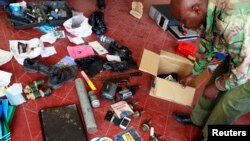One man was killed early Monday as Kenyan police raided two mosques allegedly controlled by radical youths in Mombasa as worshippers held morning prayers, officials said.
Mombasa police Officer Geoffrey Mayek said the raid of the Musa and Sakina mosques was prompted by reports that weapons were stored at the sites and the youths were planning terror attacks.
Mayek said a 20-year-old man was shot dead by police during the raid in the Musa mosque after he tried to throw a grenade at officers, the French news agency AFP reported.
"We have been receiving information that there are a number of firearms and grenades, which are hidden inside Sakina and Musa mosque," Mayek said. "So we planned for an operation last night in Sakina mosque, [where] we recovered three hand grenades and one pistol with a six rounds of ammunition. In Musa mosque we recovered five grenades and some pangas [machetes] and knives."
Hundreds of arrests
Mayek said they also arrested 251 youths. The investigation is ongoing, he added.
Mombasa Deputy County Commissioner Mohamoud Salim has called on the Muslim community to take charge of the two mosques, where the previous leaders were driven out by the youths.
"A mosque has its own rules and laws and has its committee members, but these two mosques have all lost direction," Salim said. "We want the Muslim community to sit down and tell us the way forward. But when we hear people committing crimes, when you are told someone is passing there and has a gun, tell me how are you going to wait?"
Security forces first stormed Musa mosque in February of this year. In that raid, they recovered weapons, knives, and video disks and flags that bore the symbols of al-Shabab, a Somali militant group.
Authorities have accused clerics in the two mosques of radicalizing the youths in the rundown neighborhood of Majengo.
Security analyst Andrew Franklin told VOA that Kenya's security agencies repeatedly use the same tactics to crack down on people it perceives to be terrorists - but the problems remain.
"The problems continue to come back in much serious forms and it seems there is no intelligence being given to the police," Franklin said. "It seems to be a situation where they continue to round up the youths and the extrajudicial killings of so-called radical preachers and imams, there are a whole host of unresolved gun and grenade attacks. … And it seems to be a general ground swell of opinion, of anti-government opinion."
Dozens of Muslim clerics, both radical and moderate, have been killed in Mombasa over the past few years.
Radical youths operations
Since the death of radical Kenyan cleric Sheikh Abubakar Shariff, also known as Makaburi, the radical youths have lacked a vocal supporter or leader and much of their activities have gone underground.
In the past six months, the radical youths have decided not to speak to the media, but to operate in groups to carry out attacks against people they perceive to work with the government in providing information, as well as security forces and moderate clerics.
Police said there has been an increase in gun and knife attacks in Mombasa, which they blame on the radical youths.
Earlier this month, Sheikh Salim Bakari Mwarangi, who supported the efforts to stamp out radicalism in the restive coastal region, was shot and killed by unknown assailants.
In June, Sakina mosque preacher Sheikh Mohammed Idris, chairman of the Council of Imams and Preachers, was killed by unknown gunmen near his home.




